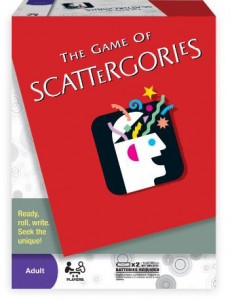This is one of my favorite games from back home. If it is fun for 20 and 30 somethings to do on a Friday night it’s sure to hold the interest of ESL students. I’m still trying to find ways to make a variant of the game myself but the version I play in the classroom is pretty much the same as the Milton Bradly game of the same name.
I’ve started out with 10 very simple categories.
1. Colors
2. Fruits
3. Drinks
4. Vegetables
5. Sports/Hobbies
6. Past tense verbs
7. Adjectives
8. Countries
9. Cities
10. Subjects in school
I have students call out a page number from the text book and use the first letter on that page as the letter for each round. So for example, the first letter is T then the students have 3 minutes to fill out the list 1-10 using words that start with the letter T. The object is to score points by using a word that no other team uses. For example: The categories is countries so team 1 writes Thailand, team 2 writes Turkmenistan and team 3 writes Thailand. Team 2 gets one point for writing Turkmenistan a word no one else used while the other 2 teams get no points. (This example just happened in class and I was impressed the students knew Turkmenistan)

The good thing about this game is that it encourages students to think of uncommon vocabulary rather than the easy stuff. I usually play 3 rounds with 3 different letters and then the team with the most points wins. It’s a good go to game if you need to fill time at the end of a lesson after going through the material. The first few classes I played this with really to enjoyed it. It seems to work best with the older students and they have a fun time trying to figure out the tougher ones. The best part about the game is that with one list of categories you can play many times and not have the same letter so it doesn’t get boring.
Eventually I’ll make up lists with more complicated categories and will probably steal from the board game itself. Other examples include:
Intermediate
Things found in the classroom
Things at a picnic
Things found at the beach
Things that use a motor
Past continuous verbs- ex: “was reading” for “R”
Even more difficult
Prepositions
Names of athletes
Capital cities
Bodies of water
Western musicians
Games like this are great for learning any language! Fun reminder!